MercoPress. South Atlantic News Agency
Tag: Sao Pablo
-
Saturday, June 15th 2013 - 04:01 UTC
Brazil bus-fares protests extend with hundreds arrested and dozens wounded
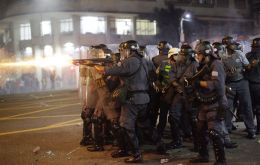
More than a hundred people were arrested and dozens wounded as police in Sao Paulo clashed with activists on Thursday night in the latest and most rowdy in a rising tide of protests against bus, metro and train fare increases in Brazil.
-
Friday, June 14th 2013 - 08:19 UTC
Countdown for 2014 World Cup takes off with simultaneous events in Rio, Sao Paulo and Brasilia
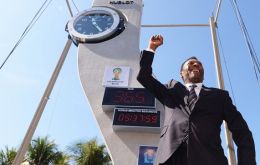
The countdown to 2014 FIFA World Cup Brazil officially began this Wednesday 12 June. Simultaneous events in the cities of Rio de Janeiro, Sao Paulo and Brasilia celebrated the unveiling of a clock marking the time remaining to the opening game of Brazil 2014.
-
Monday, June 3rd 2013 - 17:43 UTC
Millions turn out in Sao Paulo in support of Gay Pride Parade
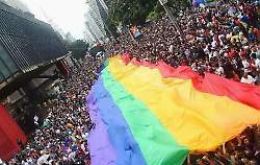
Millions gathered on Sunday in Sao Paulo, Brazil to take part in one of the largest parades in the world. According to the organizers, 3.5 million people attended the parade and the festivities that followed.
-
Saturday, May 18th 2013 - 01:11 UTC
UK attends with 28 companies the largest healthcare exhibition in Sao Paulo
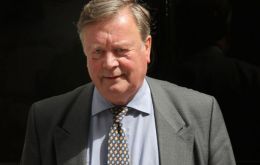
UK Government Minister Ken Clarke is leading the UK's largest ever Healthcare Technology and Life Sciences delegation to Brazil. Twenty eight companies will travel to Sao Paulo to attend Hospitalar (21 – 24 May), the largest healthcare exhibition in South America, which is expecting to attract around 90,000 visitors – as well as taking part in the trade mission.
-
Monday, May 13th 2013 - 04:08 UTC
German president in Brazil to promote trade and investments
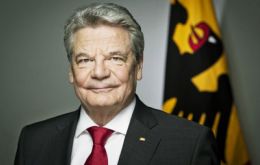
German President Joachim Gauck arrived on Sunday to Brazil with economic and trade issues as the centre of his visit. The trip to Sao Paulo marks the start of the Year of Germany in Brazil, which Gauck's predecessor Christian Wulff agreed on with Brazilian President Dilma Rousseff in May 2011.
-
Tuesday, April 2nd 2013 - 19:42 UTC
Real estate prices’ increase in Rio and Sao Paulo among the highest in the world
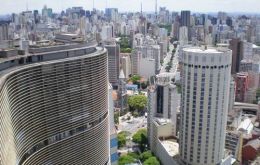
The latest Knight Frank’s Global Real Estate Index released this month has Brazil ranking No. 3 in the world and No. 1 in the Americas for rising home prices. Only ridiculously expensive Hong Kong and Dubai, which are not countries, have seen prices rise more. So in fact, no single country has seen its housing prices increase as much as Brazil.
-
Tuesday, December 4th 2012 - 16:19 UTC
For Spain’s Santander bank Brazil is number one and ‘absolute preference’
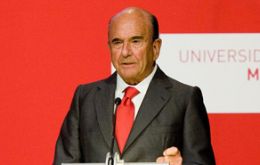
Emilio Botin chairman of Santander Bank, the leading financial institution in Spain and among the top largest in the European Union said in Sao Paulo that Brazil is the “number one country in Latin America” and the absolute preference of his institution.
-
Tuesday, November 27th 2012 - 22:25 UTC
FIFA warns Brazil on Sao Paulo crime and insufficient infrastructure for 2014 Cup
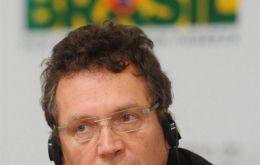
FIFA general secretary, Jerome Valcke has warned Brazil of the increasing crime rate in cities like Sao Paulo and also stressed on the need of more infrastructure ahead of the 2014 football World Cup.
-
Monday, November 26th 2012 - 23:32 UTC
Brazil’s largest city replaces all chiefs of police to contain an escalating wave of killings
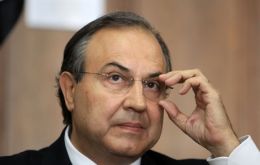
The chiefs of police in Sao Paulo were replaced on Monday as Brazil's largest city emerged from a bloody weekend and authorities struggled to contain a wave of violence that has doubled the murder rate in recent months.
-
Monday, November 26th 2012 - 06:46 UTC
Dilma Rousseff sacks top officials involved in influence-peddling ring

Brazilian president Dilma Rousseff moved quickly and with no consideration for political allies ordered the dismissal on Saturday of all government officials allegedly involved in a bribery ring, including the country's deputy attorney general.
